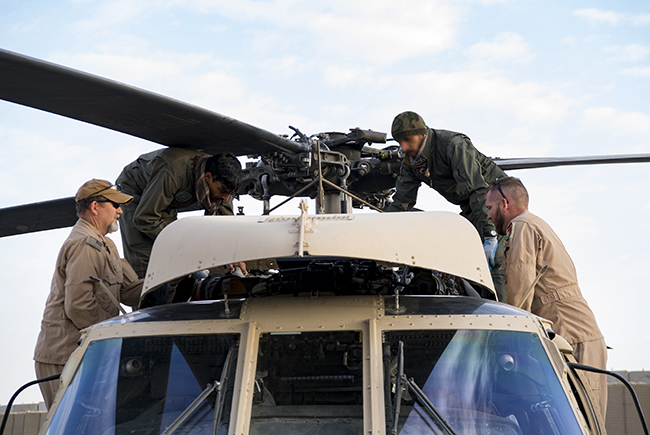
Afghan Air Force student pilots work with American contractor flying instructors on pre-flight checks on a AAF UH-60 Blackhawk on Dec. 8, 2018, in Kandahar, Afghanistan. Air Force photo by SSgt. Clayton Cupit.
The Afghan government and security forces will not be able to exist following a US withdrawal without extensive foreign support, the Pentagon’s Special Inspector General for Afghan Reconstruction said Thursday.
In a report released Thursday, SIGAR outlines the “high risk” parts of the US-led Afghan reconstruction effort, noting that the limited effectiveness of the country’s government could end without foreign help.
“Without financial support from international donors, the government of Afghanistan cannot survive,” SIGAR John Sopko said at a Center for Strategic and International Studies event in Washington, D.C. Afghanistan’s “sluggish economic growth, anemic revenue, massive government obligations, and rampant corruption” means that the government cannot finance its costs “for many years to come,” he added.
US and Taliban representatives have been meeting in recent months to determine a possible framework for peace, and policy makers need to understand the gains that have been made would be in danger without sustained support.
For example, Sopko said the two most successful segments of the Afghan military—its “nascent” air force and special forces—are only sustainable with US support. The Afghan Air Force recently began receiving UH-60 Black Hawk helicopters, equipment that US contractors are training Afghan forces on, and those contractors in turn need to be protected. Without this US support, the AAF “will cease to exist after we leave. Without external support, the Afghan military is in trouble, not only financially, but also technically,” Sopko said.
The SIGAR report highlighted specific high-risk areas in Afghanistan, including widespread insecurity, underdeveloped civil policing, endemic corruption, sluggish economic growth, illicit narcotics trade, threats to women’s rights, reintegration of ex-combatants, and restricted oversight. These are realities that policy makers need to confront as the peace process continues, he said.
“If the US reduces its presence in Afghanistan but feels compelled to provide significant financial support for reconstruction, there may be little choice but to provide a greater proportion of funding as on-budget assistance,” Sopko said. “But if that road is taken and conditions are lacking, we may as well set the cash ablaze on the streets of Kabul for all the good it will do.”